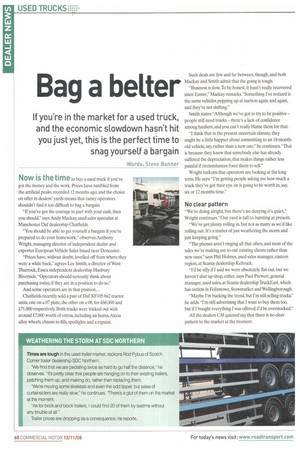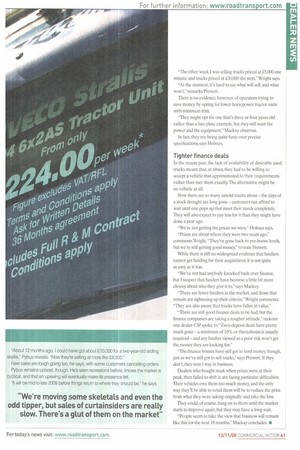Bag a better
Page 60

Page 61

If you've noticed an error in this article please click here to report it so we can fix it.
If you're in the market for a used truck, and the economic slowdown hasn't hit you just yet, this is the perfect time to snag yourself a bargain
Words: Steve Banner Now is the time to buy a used truck if you've got the money and the work. Prices have tumbled from the artificial peaks recorded 12 months ago, and the choice on offer in dealers' yards means that canny operators shouldn't find it too difficult to bag a bargain.
"If you've got the courage to part with your cash, then you should," says Andy Mackay, used sales specialist at Manchester Daf dealership Chatftelds "You should be able to get yourself a bargain if you're prepared to do your homework," observes Anthony Wright, managing director of independent dealer and exporter European Vehicle Sales based near Doncaster.
"Prices have, without doubt, levelled off from where they were a while back," agrees Lee Smith, a director of West Thurrock, Essex independent dealership Hanbury Riverside. "Operators should seriously think about purchasing today, if they are in a position to do so."
And some operators are in that position...
Chatfields recently sold a pair of Daf XF105 6x2 tractor units, one on a 07 plate, the other on a 08, for £68,000 and £71,000 respectively. Both trucks were tricked out with around £7,000 worth of extras, including air horns, Alcoa alloy wheels, chassis in-fills, spotlights and a repaint. Such deals are few and far between, though, and both Mackay and Smith admit that the going is tough.
"Business is slow. To be honest, it hasn't really recovered since Easter," Mackay remarks. "Something I've noticed is the same vehicles popping up at auction again and again, and they're not shifting."
Smith states: "Although we've got to try to be positive — people still need trucks — there's a lack of confidence among hauliers, and you can't really blame them for that.
"I think that in the present uncertain climate, they might be a little happier about committing to an 18-monthold vehicle, say, rather than a new one," he continues. "That is because they know that somebody else has already suffered the depreciation; that makes things rather less painful if circumstances force them to sell."
Wright reckons that operators are looking at the long term. He says: "I'm getting people asking me how much a truck they've got their eye on is going to be worth in, say, six or 12 months time."
No clear pattern
"We're doing alright, but there's no denying it's quiet," Wright continues. "Our yard is full to bursting at present.
"We've got plenty rolling in, but not as many as we'd like rolling out. It's a matter of just weathering the storm and just keeping going."
"The phones aren't ringing all that often, and most of the sales we're making are to our existing clients rather than new ones," says Phil Holmes, used sales manager, eastern region, at Scania dealership Keltruck.
"I'd be silly if I said we were absolutely flat-out, but we haven't shut up shop, either, says Paul Prewett, general manager, used sales, at Scania dealership TruckEast, which has outlets in Felixstowe, Stowmarket and Wellingborough.
"Maybe I'm bucking the trend, but I'm still selling trucks," he adds "I'm still advertising that I want to buy them too, but if I bought everything I was offered, I'd be overstocked."
All the dealers CM quizzed say that there is no clear pattern to the market at the moment. "The other week I was selling trucks priced at 15,000 one minute, and trucks priced at /30,000 the next," Wright says "At the moment, it's hard to say what will sell, and what won't," remarks Prewett.
There is no evidence, however, of operators trying to save money by opting for lower horsepower tractor units with minimum trim.
"They might opt for one that's three or four years old rather than a late-plate example, but they still want the power and the equipment," Mackay observes In fact, they are being quite fussy over precise specifications, says Holmes
Tighter finance deals
In the recent past, the lack of availability of desirable used trucks meant that, at times, they had to be willing to accept a vehicle that approximated to their requirements rather than met them exactly. The alternative might be no vehicle at all.
Now there are so many unsold trucks about — the days of a stock drought are long gone — customers can afford to wait until one pops up that meet their needs completely. They will also expect to pay less for it than they might have done a year ago.
"We're not getting the prices we were," Holmes says.
"Prices are about where they were two years ago," comments Wright. "They've gone back to pre-boom levels, but we're still getting good money," reveals Prewett.
While there is still no widespread evidence that hauliers cannot get funding for their acquisitions. it is not quite as easy as it was "We've not had anybody knocked back over finance, but I suspect that funders have become a little bit more choosy about who they give it to," says Mackay.
"There are fewer funders in the market, and those that remain are tightening up their criteria," Wright comments "They are also aware that trucks have fallen in value."
"There are still good finance deals to be had, but the finance companies are taking a tougher attitude," reckons one dealer CM spoke to. "Zero-deposit deals have pretty much gone — a minimum of 10% or thereabouts is usually required — and any haulier viewed as a poor risk won't get the money they are looking for."
"The finance houses have still got to lend money, though, just as we've still got to sell trucks," says Prewett. If they don't, they won't stay in business Dealers who bought stock when prices were at their peak, then failed to shift it, are facing particular difficulties Their vehicles owe them too much money, and the only way they'll be able to retail them will be to reduce the price from what they were asking originally and take the loss.
They could, of course, hang on to them until the market starts to improve again; but they may have a long wait.
"People seem to take the view that business will remain like this for the next 18 months," Mackay concludes. i•












































































































































































